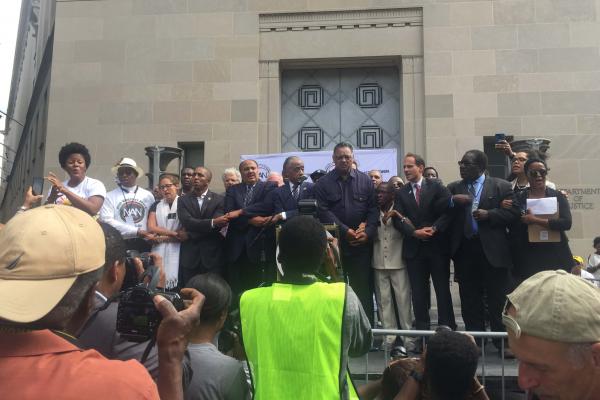On the 54th anniversary of the “I Have a Dream” speech, the voice of Dr. Martin Luther King Jr. echoed across the lower end of the National Mall as thousands of clergy gathered in Washington, D.C., to march for racial justice. The Ministers March for Justice brought together faith leaders of many traditions to speak out against racism and white supremacy, and sought to call the government to accountability.
Rev. Jeanne Befano, a retired Lutheran pastor, marched these streets 54 years ago with Dr. King. Today, she said she felt compelled to again, but grieved the need for it.
“We shouldn’t have to be here to do this anymore. But we are,” she said.
Several leaders encouraged those gathered to reflect on the continued injustices to which people of color and other minorities are subjected, something W. Franklyn Richardson, of the National Action Network, which organized the march, described as “an assault on humanity … an attack on morality.”
Speakers represented faiths from across the U.S., as Christian, Jewish, Muslim, and Sikh faith leaders spoke to address myriad injustices from racial and gender-based discrimination to health care, the environment, police brutality, criminal justice, poverty, and immigration.
April Baskin, of the Union for Reformed Judaism, said interfaith collaboration is a powerful means of achieving true progress.
“We’re far more connected than we’re not,” Baskin said. “… Across our communities there is a collective sense of the sanctity of life, and the need to come together.”
The group proceeded from the Martin Luther King Jr. Memorial and traveled more than a mile and a half to the Department of Justice, catching glimpses of both the White House and Trump Hotel.
Marchers called on President Donald Trump and Attorney General Jeff Sessions to end their pursuit of policies and objectives that hurt racial minorities and further oppress the poor — like rolling back voting rights, enforcing mandatory minimums, and enacting harsh immigration enforcement against law-abiding immigrants. They also called on Trump to unequivocally denounce, in word and deed, white supremacist and other hate-based groups.
The speakers at the Ministers March preached hope, but were not deluded about the hardship of present times. The theme of faithful resistance pervaded each address; speakers repeated the phrase “we are not going back,” as an answer to those seeking to “make America great again.”
Rev. Al Sharpton, historic civil rights leader and organizer of the march, reminded attendees that the work of justice goes beyond any one person, and cannot be stopped.
"They shot the dreamer, but they didn’t shoot the dream,” Sharpton said.
As the rally neared its end, many of the organizers led attendees in “We Shall Overcome,” as the crowd joined in, arms linked.
“How long?” asked Martin Luther King III; the crowd roared, “not long!”
Sojourners Associate Web Editor Dhanya Addanki contributed to this piece.
Got something to say about what you're reading? We value your feedback!






